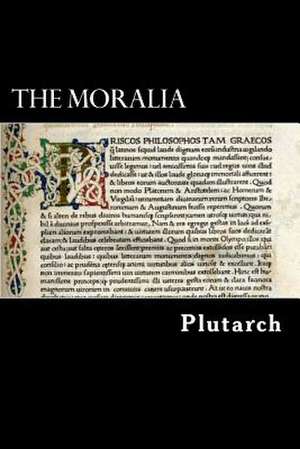The Moralia
Autor Plutarch Ilustrat de Alex Struik Traducere de Shilleto, Arthur Richarden Limba Engleză Paperback
| Toate formatele și edițiile | Preț | Express |
|---|---|---|
| Paperback (2) | 167.86 lei 3-5 săpt. | |
| CREATESPACE – | 167.86 lei 3-5 săpt. | |
| Geikie Press – 15 noi 2007 | 271.06 lei 6-8 săpt. |
Preț: 167.86 lei
Nou
Puncte Express: 252
Preț estimativ în valută:
32.12€ • 33.66$ • 26.55£
32.12€ • 33.66$ • 26.55£
Carte disponibilă
Livrare economică 22 martie-05 aprilie
Preluare comenzi: 021 569.72.76
Specificații
ISBN-13: 9781481079884
ISBN-10: 1481079883
Pagini: 524
Dimensiuni: 152 x 229 x 27 mm
Greutate: 0.69 kg
Editura: CREATESPACE
ISBN-10: 1481079883
Pagini: 524
Dimensiuni: 152 x 229 x 27 mm
Greutate: 0.69 kg
Editura: CREATESPACE
Notă biografică
Plutarch (c. AD 46 - c. 120), later named, upon becoming a Roman citizen, Lucius Mestrius Plutarchus, was a Greek biographer and essayist, known primarily for his Parallel Lives and Moralia. Plutarch was born to a prominent family in the small town of Chaeronea, about 80 kilometres (50 mi) east of Delphi, in the Greek region of Boeotia. Plutarch studied mathematics and philosophy at the Academy of Athens under Ammonius.
Plutarch lived most of his life at Chaeronea, and was initiated into the mysteries of the Greek god Apollo. For many years Plutarch served as one of the two priests at the temple of Apollo at Delphi, the site of the famous Delphic Oracle, twenty miles from his home. He probably took part in the Eleusinian Mysteries. By his writings and lectures Plutarch became a celebrity in the Roman Empire, yet he continued to reside where he was born, and actively participated in local affairs, even serving as mayor. At his country estate, guests from all over the empire congregated for serious conversation, presided over by Plutarch in his marble chair.
Plutarch was also a magistrate at Chaeronea and he represented his home town on various missions to foreign countries during his early adult years. Plutarch held the office of archon in his native municipality, probably only an annual one which he likely served more than once. He busied himself with all the little matters of the town and undertook the humblest of duties.
